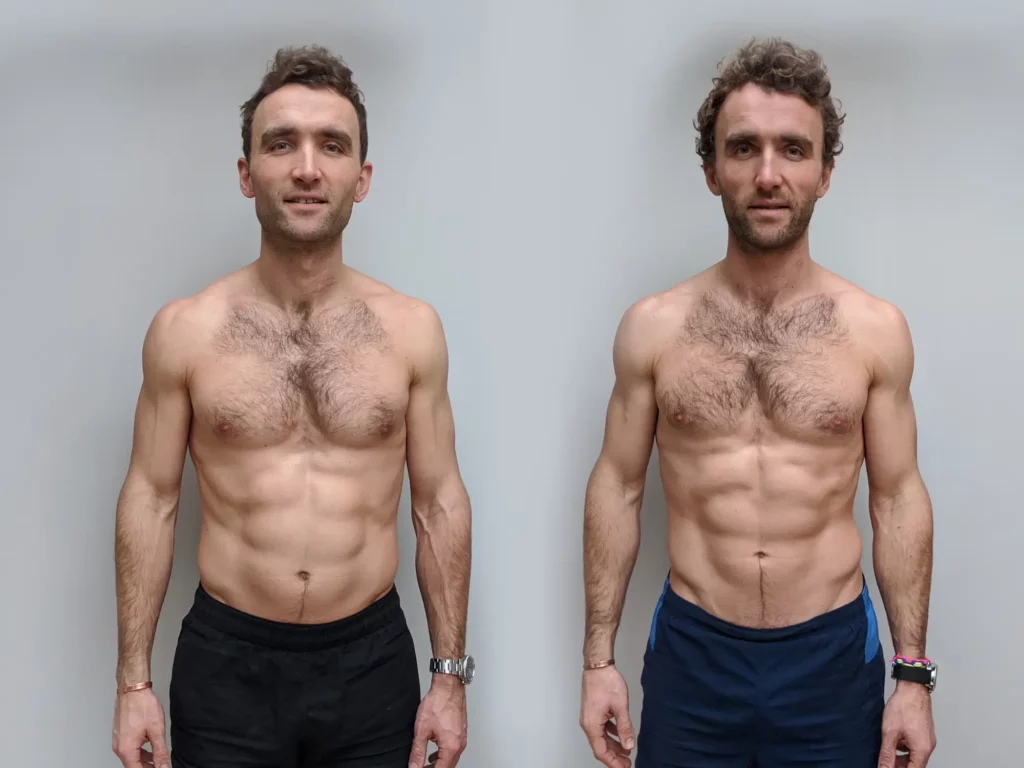Hugo and Ross Turner
Known for their daring expeditions, identical twins Hugo and Ross Turner decided to undertake a different kind of adventure; this time, it was a dietary exploration.1 In 2020, They set off comparing the effects of a vegan diet and an omnivorous diet on two genetically identical individuals- themselves. Their motivation for this unique 12-week experiment, from January to March, was stirred by the increasing popularity and controversy of vegan diets among athletes, as highlighted in documentaries such as “The Game Changers.”2
The twins kept their fitness training regime consistent to ensure fairness and eliminate bias. Ross, who is a personal trainer, designed the program, which involved endurance training five to six days a week. Their meals were prepared by the Mindful Chef delivery service, ensuring they consumed a nearly identical number of calories each day. While Hugo committed to a vegan diet, Ross followed an omnivorous diet. Researchers from King’s College, London, monitored their basic health metrics, such as weight, cholesterol levels, and muscle mass, over the course of the experiment.

The Advantages of Embracing a Vegan Diet
A plant-based diet, rich in whole, unprocessed foods, decreases the likelihood of developing heart disease and enhances overall well-being.
Primarily composed of vegetables, fruits, legumes, whole grains, nuts, and seeds, this diet is low in saturated fats and full of heart-friendly fats and dietary fiber. Additionally, these plant-based foods provide our body with essential vitamins, minerals, antioxidants, and phytochemicals, all of which collectively strengthen our defense against various diseases.3
Several studies illustrate that vegan diets are linked to a decreased risk of heart disease. Individuals following a vegan or vegetarian lifestyle generally have lower blood pressure and LDL (bad) cholesterol levels compared to non-vegetarians. Certain research also suggests that well-structured vegan and vegetarian diets can aid in regulating blood sugar levels and potentially decrease body inflammation.
It is important to note that while these plant-based diets contribute to health improvement, the overall healthier lifestyles often associated with vegans and vegetarians, such as increased physical activity and reduced alcohol intake, also significantly reduce health risks.
Read: Eating This Fruit Has Been Associated With Lower Risk Of Cardiovascular And Coronary Heart Disease
Unveiling The Turner’s Results
As the weeks passed, the brothers started noticing some significant changes. Hugo, after adopting the vegan diet, reported feeling more energized during his gym sessions and noted improved mental focus, a stark contrast from his previous routine. He attributed this to a shift in his snacking habits – he replaced biscuits and chips with fruits and nuts, given the latter’s vegan-friendly nature.
One of Hugo’s dietary changes’ more striking results was his weight and body fat reduction. He started the experiment at about 185 pounds and 13% body fat but ended up weighing 181 pounds, with a drop in body fat percentage to 12%. He also noticed a reduction in his cholesterol levels. However, there was a noticeable downside – Hugo experienced a marked decline in his libido while on the vegan diet.4
Ross, who was slightly bigger than his brother to start with, noticed different results. Adhering to an omnivorous diet, he gained 10 pounds of muscle but also saw an increase in fat, which raised his body fat percentage to 15%. Unlike Hugo, Ross’s cholesterol levels remained consistent throughout the experiment.
